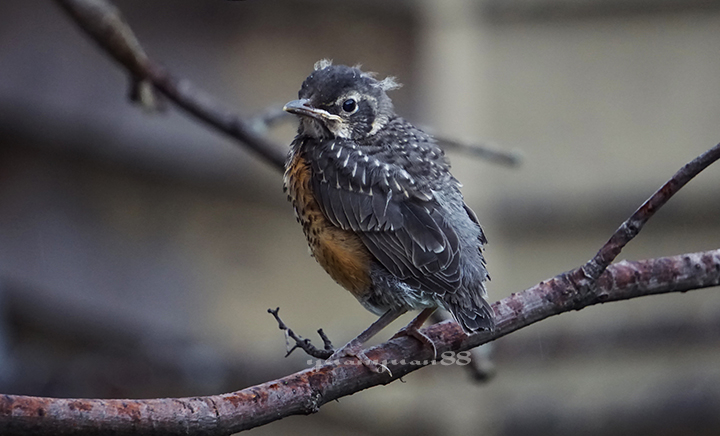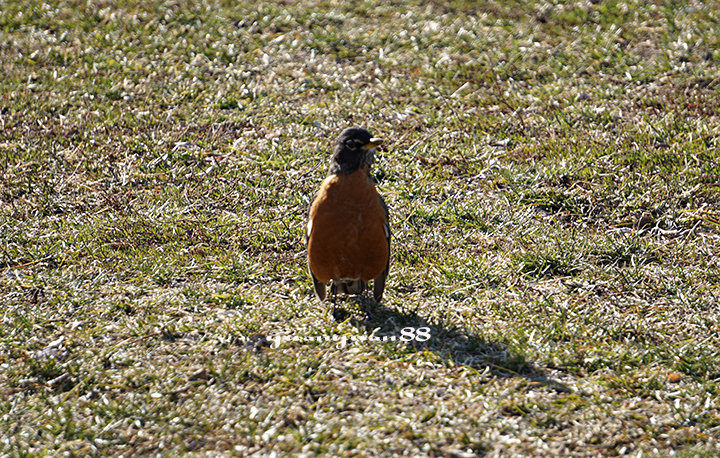宝贝妈妈来喂你了 我成了落汤鸟
出门不久,眼前一晃突然看见了一只鸟飞在了树枝上,然后看见另一只飞来,前面的那只就张大了嘴巴,原来是只小小的知更鸟,刚离窝还不太会飞,赶紧回家拿相机,心想再回去可能早飞走了,但还是存着侥幸心。果然,小小知更鸟飞的能力还不强,还在那老老的抓住树枝等着妈妈来喂食。我悄悄地靠近,它也看见我了,但它不能飞走,飞走的话妈妈回来找不到它了。所以它就看着我好像对我说,它要等妈妈回来,让我不要伤害它,我也就停在了能够拍到的位置,然后就像个稻草人一动不动的站在那儿,轻轻地打开相机拍,因为我要让它的妈妈知道我只是个稻草人,不会妨碍它们的,果然它妈妈看看我觉得没有很大的危胁,就继续喂着小鸟。妈妈每次喂完后就飞走再去找,其中等的时间有的挺长的,毕竟要找到蚯蚓也是要花些时间的,小小知更鸟就犯困,看看我,看着看着就会打磕睡,这样我大概拍了一个小时,后来下雨了,开始还好,后来越下越大,我拿了个信封挡在相机的上方,人只能在雨中淋个澡了,我舍不得走开,这样的拍摄机会太难得了,简直是碰上了。但后来雨太大了,信封湿透了,相机不能淋湿,我只好告别了小小鸟,看它还在雨中等着妈妈送来吃的,它要快快的长大。
我拍到了妈妈抓来了好大的蚯蚓,小小鸟吃起来可真爽啊。看得我都流口水。点击视频看可爱的小小知更鸟。
小小知更鸟(看得出羽毛不发达,所以飞起来还很菜。)

成年知更鸟(胸前一大片橘红色,典型的知更鸟模样。)

下面是我参照网上找来的内容重新编写的解说词。
That day I saw an American robin flew to sit on a branch. I realized this was a baby robin when I saw its parent was feeding it. I took out my camera and was quietly filming about an hour. The baby saw me but it had to stay there to wait for its parent. This gave me the golden opportunity to film the amazing scene. And I googled robin and learned a lot of this bird. This baby must be two weeks old and is a fledgling just left the nest.
Baby robins are ready to leave the nest when they are about 13 days old. Leaving the nest is called fledging. This is a dangerous time for baby robins. Once babies fledge, both parents still feed them for a few days. Baby robins can't fly well when they leave the nest. They must build up muscles and grow adult feathers to be strong fliers. The babies are capable fliers just 10-15 days after fledging. Mom soon leaves to lay a new clutch of eggs. The fledglings will need to learn from other robins when Dad leaves to help with new nestlings. So I could not tell whether it was the mother or father feeding this baby.
After Mon laid the eggs, the first baby hatches 12-14 days. Hatching can take all day. Each chick must fight its way out of the egg. First it breaks a hole in the shell with its egg tooth, a hook on its beak. Then the baby pokes, stretches, and struggles inside the egg, with many stops to rest. Finally it breaks free.
A newly-hatched robins weigh about 5.5 grams, a little less than a quarter. Baby robin skin is clear enough to allow us to see some of the internal organs. Three things a baby robin know as soon as it hatches;to sit very still when its parents are away, to pop up and open its mouth to beg for food the moment its parents return, and to poop as soon as it swallows some food. Baby robins produce their poop in fecal sacs, encased in strong membranes. They don't leak, so the nest is clean. Baby robins are helpless at birth but grow fast! They reach the size of their parents after just two weeks!
When they first hatch, they probably don't recognize their parents! They know the parents have arrived with food by the "bounce" they feel on the nest, and on a sunny day by their parents' shadow. Little by little, they start learning the sounds of their parents. By the time their eyes open, they already know their parents' voices.
Robins identify their babies by sight and sound, not by smell.
For the first four days of a nestling's life, the parent birds regurgitate partly digested food into each baby's mouth . By five days of age, the nestlings get earthworms that parents break into small mouthfuls. Soon parents give them whole worms and large insects, and worms are not even their main food! Both parents have full-time jobs. They protect the nest, find food, and feed hungry babies. A robin might make 100 feeding visits to its nest each day. So you can see robins are very responsible and busy birds.
It started raining. It rained hard on me and the bird. I had to say goodbye to the baby.
欢迎来我的频道定阅
我拍到了妈妈抓来了好大的蚯蚓,小小鸟吃起来可真爽啊。看得我都流口水。点击视频看可爱的小小知更鸟。
小小知更鸟(看得出羽毛不发达,所以飞起来还很菜。)

成年知更鸟(胸前一大片橘红色,典型的知更鸟模样。)

下面是我参照网上找来的内容重新编写的解说词。
That day I saw an American robin flew to sit on a branch. I realized this was a baby robin when I saw its parent was feeding it. I took out my camera and was quietly filming about an hour. The baby saw me but it had to stay there to wait for its parent. This gave me the golden opportunity to film the amazing scene. And I googled robin and learned a lot of this bird. This baby must be two weeks old and is a fledgling just left the nest.
Baby robins are ready to leave the nest when they are about 13 days old. Leaving the nest is called fledging. This is a dangerous time for baby robins. Once babies fledge, both parents still feed them for a few days. Baby robins can't fly well when they leave the nest. They must build up muscles and grow adult feathers to be strong fliers. The babies are capable fliers just 10-15 days after fledging. Mom soon leaves to lay a new clutch of eggs. The fledglings will need to learn from other robins when Dad leaves to help with new nestlings. So I could not tell whether it was the mother or father feeding this baby.
After Mon laid the eggs, the first baby hatches 12-14 days. Hatching can take all day. Each chick must fight its way out of the egg. First it breaks a hole in the shell with its egg tooth, a hook on its beak. Then the baby pokes, stretches, and struggles inside the egg, with many stops to rest. Finally it breaks free.
A newly-hatched robins weigh about 5.5 grams, a little less than a quarter. Baby robin skin is clear enough to allow us to see some of the internal organs. Three things a baby robin know as soon as it hatches;to sit very still when its parents are away, to pop up and open its mouth to beg for food the moment its parents return, and to poop as soon as it swallows some food. Baby robins produce their poop in fecal sacs, encased in strong membranes. They don't leak, so the nest is clean. Baby robins are helpless at birth but grow fast! They reach the size of their parents after just two weeks!
When they first hatch, they probably don't recognize their parents! They know the parents have arrived with food by the "bounce" they feel on the nest, and on a sunny day by their parents' shadow. Little by little, they start learning the sounds of their parents. By the time their eyes open, they already know their parents' voices.
Robins identify their babies by sight and sound, not by smell.
For the first four days of a nestling's life, the parent birds regurgitate partly digested food into each baby's mouth . By five days of age, the nestlings get earthworms that parents break into small mouthfuls. Soon parents give them whole worms and large insects, and worms are not even their main food! Both parents have full-time jobs. They protect the nest, find food, and feed hungry babies. A robin might make 100 feeding visits to its nest each day. So you can see robins are very responsible and busy birds.
It started raining. It rained hard on me and the bird. I had to say goodbye to the baby.
欢迎来我的频道定阅
戳这里 Claim your page
来源: 文学城-yuanyuan88